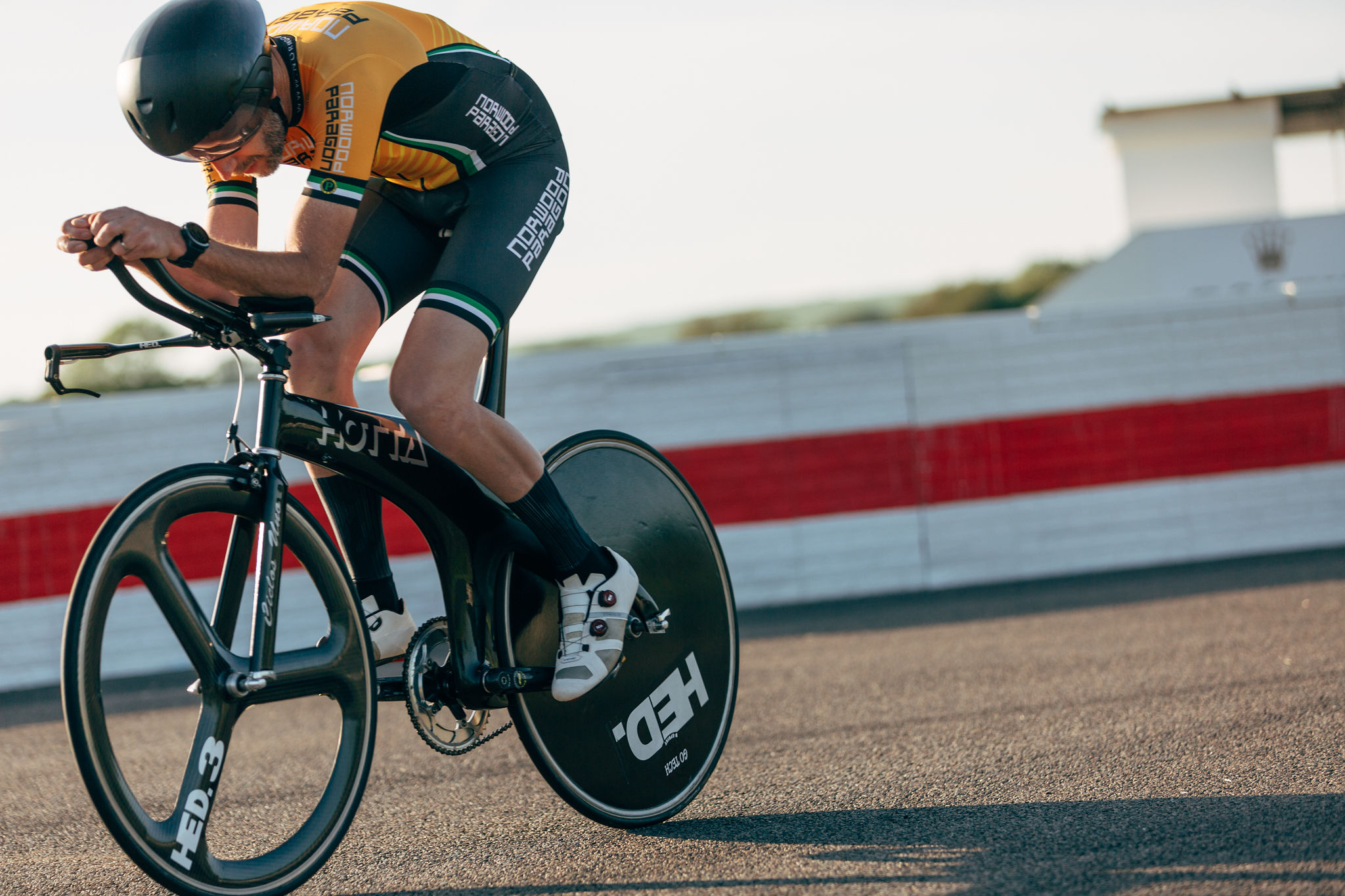In the wind tunnel with Alan Murchison, the world's fastest Michelin-starred chef
How to serve up an 18-minute '10' at age 51 - the Performance Chef's recipe for time trial success
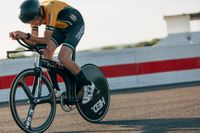
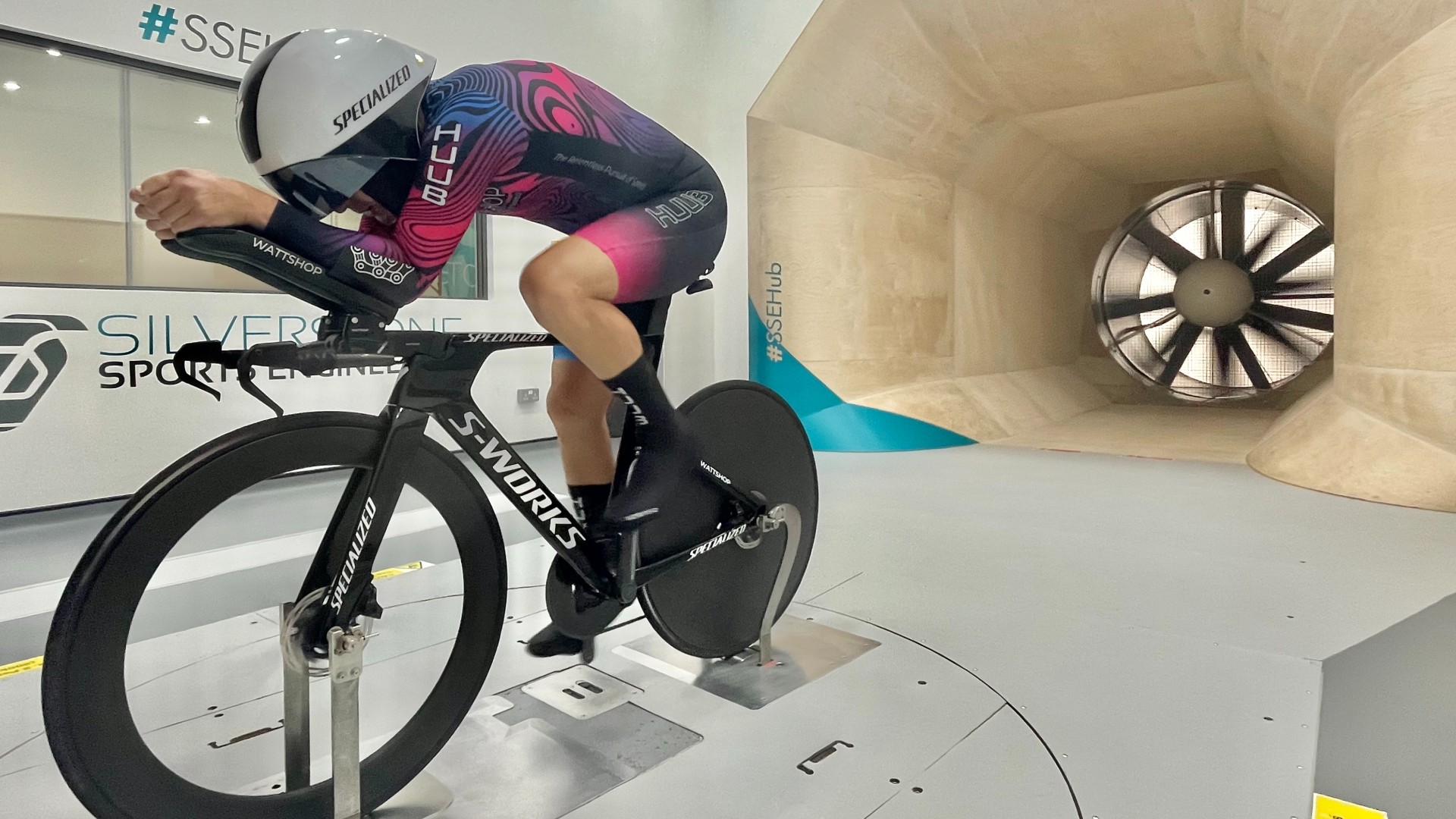
The latest race content, interviews, features, reviews and expert buying guides, direct to your inbox!
You are now subscribed
Your newsletter sign-up was successful
Alan Murchison - Michelin-starred chef turned performance nutrition guru and best-selling cook book author - is currently working with the Specialized Factory Racing mountain bike team. He spends two weeks out of every month abroad, preparing nutritious meals for the riders.
But when he’s back in the UK, the 51-year-old Performance Chef is cooking up a storm on his local time trial circuits, not to mention handing some much younger riders their skinsuited rear ends on a plate.
Earlier this month he recorded 18.45 for 10 miles.

You can’t out-train a bad diet as they say, but once his food intake is sorted Murchison’s personal recipe for success is in tweaking his equipment to the nth degree in the wind tunnel.
“That’s the beauty of time trialling,” he says. “When you’re time-poor, as a lot of people are, your equipment, your position, which is 50 or 60% of going fast on a TT bike, is something you can work on well in advance.”
Before his 18-minute ride on the F11 course near Tring in Hertfordshire, Murchison visited the Silverstone Sports Engineering Hub wind tunnel with his already super-aero S-Works Shiv TT bike.
A post shared by Alan Murchison (@performance.chef)
A photo posted by on
“With that bike the low-hanging fruit is long gone,” he admits. “You look at the bike and think, where are you going to optimise? It’s got CeramicSpeed all over it, oversized jockey wheels, the chain alignment sorted. How are you going to make the bike faster? All of those things are done. You’re not going to find 30 watts.
The latest race content, interviews, features, reviews and expert buying guides, direct to your inbox!
“So we looked at position. We looked at raising the front 10mm and putting the seat back 15mm. That allowed me to stretch out a bit. Coming up 10mm allowed me a little more power while stretching out.
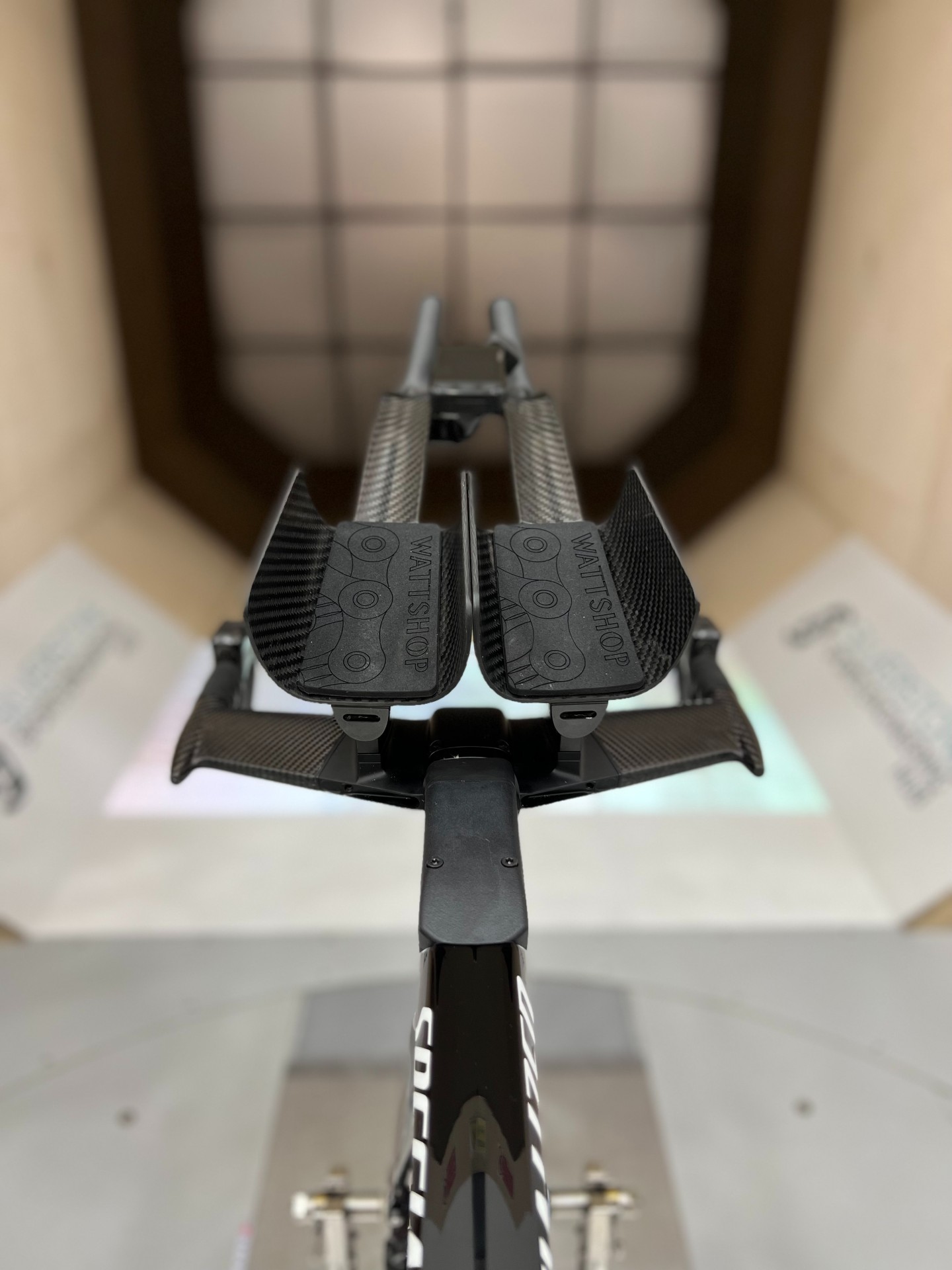
We also tested things like calf guards. There wasn’t a calf guard on the market that made me faster. Everybody wears knee-high ‘fetish socks’ but they actually made me slower. Also that shoulder scrunch where everybody tries to turtle their head in - that made me slower too.
"And we also tested the Specialized helmet."
The Specialized helmet he’s talking about is of course the new S-Works TT 5, the one with the ‘face sock’ that was widely ridiculed when it was unveiled at the Tour de France.
“Yes it looks awful but ask yourself - why would you make something that’s so ugly unless it was fast?
“We tested that helmet at 45, 50 and 55kph at 0, 5 and 10 degrees of yaw. We tested every single helmet and the Specialized helmet with the internal sock and without it. For me the TT 5 was faster in every single position except one: the POC Tempor was faster at 55kph at high yaw.”
And the face sock…?
“It was faster with the face sock. We all know that covered skin is faster. But Yves Lampaert didn’t wear the TT 5 when he won the Tour prologue… it wasn’t fast on him so he wore the old helmet - which shows aerodynamics is so personal."
Murchison continues: “The HJC Adwatt was second fastest helmet for me. The POC Tempor is difficult because it moves about The HJC works for a lot of people. Much the same as the Giro Aerohead did in the earlier days.”
Vesting in success
However, the single item that posted the biggest and the most surprising watt-saving was the Huub Aero-Bridge undervest worn under the Huub Aero Speed Suit.
Texturing under a smooth skinsuit was first trialled in the Olympics, when the Danish team pursuiters wore undervests and were promptly accused of cheating.
“That makes more of a difference than you’d ever think possible. It looks ridiculous. But again, like the Specialized helmet, why are they making something so commercially unattractive - a ribbed sports bra for men? I put it on and my partner Vicky was rolling around.
“For me - the skinsuit on its own versus with the undervest saved 13 watts. Just adding the undervest. That’s what it was in the tunnel,” says Murchison as if he still can't quite believe it.
“So if you add three watts with a helmet, three watts by not wearing overshoes, 2-3 watts from moving the seat back and 13 watts from a skinsuit amendment. Put that into the performance jigsaw puzzle and you’re saving a lot.”
If the undervest surprised everyone including Murchison himself, next he highlights certain areas of his bike’s spec that appear to go against conventional thinking.
“I’m running a 23mm front tyre. I spoke to Xavier Disley at AeroCoach and he recommends a 23 on the AeroCoach Titan front wheel, which goes against all logic. The deal now is 28mm or 32mm and to run them at low pressure.”
Murchison uses a 25mm Vittoria Corsa Speed G2.0 on the rear with the 23mm version of the same tyre on the front, both tubeless. He chooses tyre pressures according to road surface rather than by his weight: “
Really smooth, I'd run them at 95psi. A bit rougher 85 including the F11 and the Bentley bypass [H10/8 course in Hampshire] 85psi. Just because of the texture of the road. The only course I go above 85 is the A3 P course.”
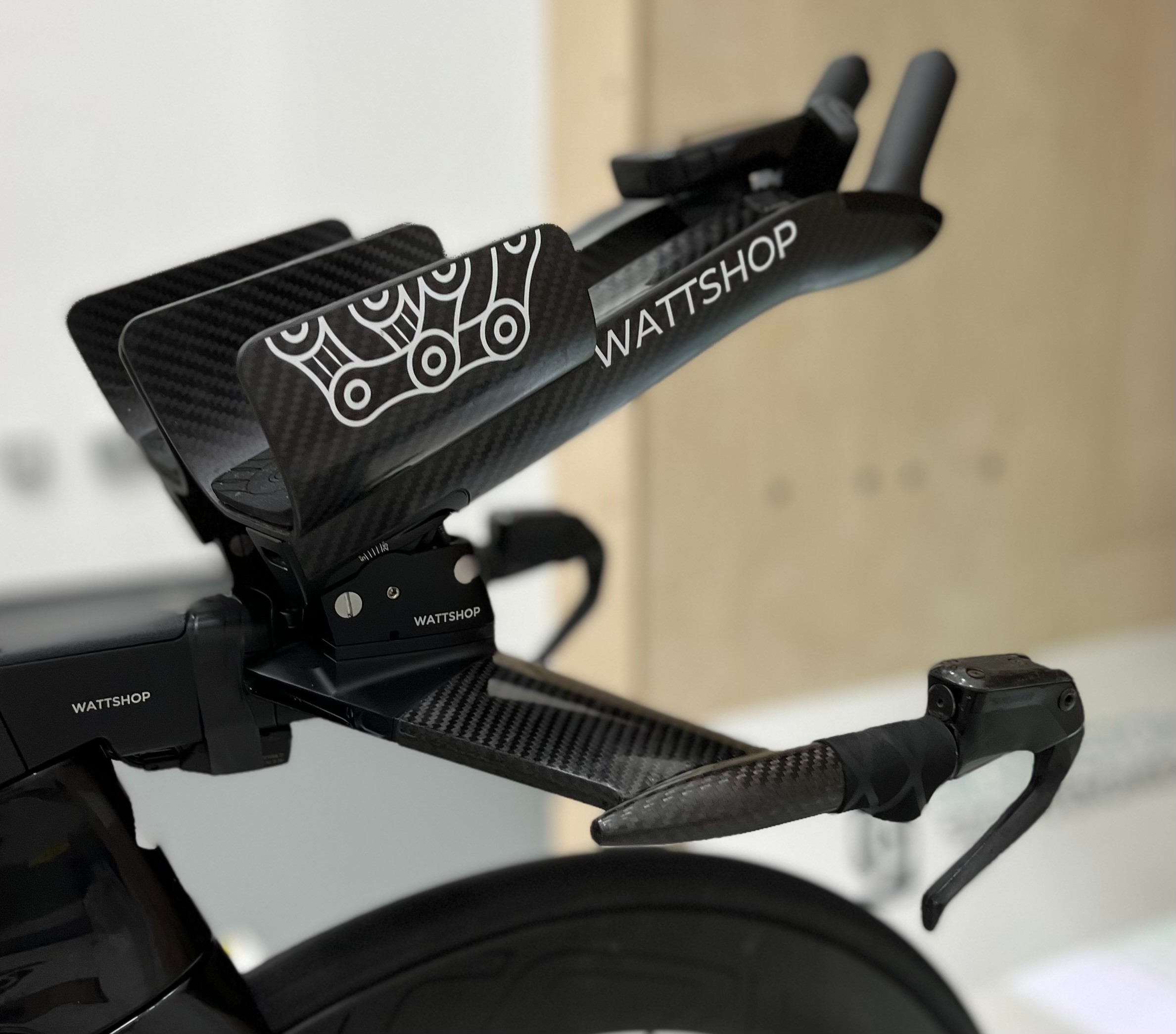
The front end of his bike features the WattShop Anemoi extensions and base bar. “That new base bar is doing something magic,” Murchison enthuses. “The standard Specialized base bar is 43cm of dead space. The one I've got is 34cm with a massive kamm tail on it.
I literally fitted the base bar and rode the 18.45. The extensions I've had for a year now.”
The chainring is a version of the track chainring Dan Bigham used to break the British hour record, says Murchison. “That runs really smoothly. It looks like a standard carbon chainring but there’s some witchcraft going on.
“The WattShop aftermarket chainring and SRAM Eagle chain compared with the original SRAM chainring and flat top AXS chain is night and day.
“If you speak to SRAM, and I work for a team that’s sponsored by SRAM, and tell them I'm not running a flat top chain on SRAM AXS for road, they’ll say it doesn’t work. I say bullshit, it’s faster. It runs faster and smoother with a waxed Eagle mountain bike chain.”
Murchison has also swapped out the SRAM derailleur cage and jockey wheels for the CeramicSpeed OSPW system and also runs a CeramicSpeed bottom bracket: he says he uses the original SRAM components for winter training.
Short 165mm cranks are specced in order to lower his whole position, while he uses WattShop Speedplay cleat adaptors on his shoes to recess the cleats: “If you can take everything down by a centimetre there’s less in the wind.”
And finally, there are 140mm rotors front and rear, with the 160mm swapped out: “Again, less metal in the wind. One one ever said they need more braking power on the TT bike.”
Future upgrades
“The next upgrades are going to be wireless blips and there’s also a couple of companies that have slightly different hydraulic brakes,” says Murchison. “SRAM hydraulic TT brakes have a massive reservoir in the front. It’s like having two matchboxes bolted onto your bike. A couple of companies are doing aftermarket brakes with smaller reservoirs that are mounted inside the bars instead of on the top… but I’m running out of things to do on it.”
Murchison has finished racing for the season but is already planning 2023.
“Next year I want to get as close to 18 minutes [dead] as I can. I’ll start gym eight weeks earlier than last year and get a bigger base, get a bit stronger. This year I was in great shape in April but got progressively shitter. Most people are the other way round."
Does Murchison have any top TT tips for those starting out?
“If I do a recovery ride or have an hour to kill on the turbo I always do it on the TT bike in position. That’s a box ticked. Even if I’m not getting in the training hours I can at least make sure my skinsuit fits, the helmet is good, all those other things that affect performance.
“About 70 per cent of my riding is in the TT position. I’m a huge believer in working the position. Yesterday I did 90 minutes just working on position.
"My best 20 minute power on the road bike is still about 40 watts more than on the TT bike even after all these years. However, I can do four hours on the TT bike with no comeback at all. So I'm efficient but I'm not one of these people who say right, I need to put out X amounts of power, because power is just part of the equation. You get these vanity watts - 'I’m doing X watts per kilo in TT position'. Do you know what? Nobody cares. It’s all about how fast you’re going for your position. I could change my position and get another 30 watts out, but I'd be going slower. Dan Bigham went two 3km further than Rohan Dennis for 60 watts less and I think you’ve got to use that as a case study. Vanity watts in time trialling is pointless.”
Murchison admits that he’s fortunate to have access to the wind tunnel and aerodynamicists, but says anyone can make improvements. “Do your club 10 every week, that helmet etc. use a mirror. I set my turbo up, i’ve got a table in front of it and I’ll get my eye line in line with the speaker and I’ll know that’s the correct position because I’ve got my side profile sorted. Just practise.”
Alan Murchison's S-Works Shiv: spec
- Wattshop Anemoi aero extensions
- Wattshop Anemoi base bar
- SRAM Red AXS group
- Roval 321 rear disc
- Aerocoach Titan front wheel
- Vittoria Corsa Speed G2.0 tyres 23mm front, 25mm rear
- Ceramicspeed OSPW rear derailleur and BB
- Wattshop Cratus chainring with Quarq Powermeter and 165mm cranks.
- SRAM Eagle chain
- Speedplay Aero pedals
- ISM PN3.0 saddle with Raceware rear light mount
Simon Smythe is a hugely experienced cycling tech writer, who has been writing for Cycling Weekly since 2003. Until recently he was our senior tech writer. In his cycling career Simon has mostly focused on time trialling with a national medal, a few open wins and his club's 30-mile record in his palmares. These days he spends most of his time testing road bikes, or on a tandem doing the school run with his younger son.
